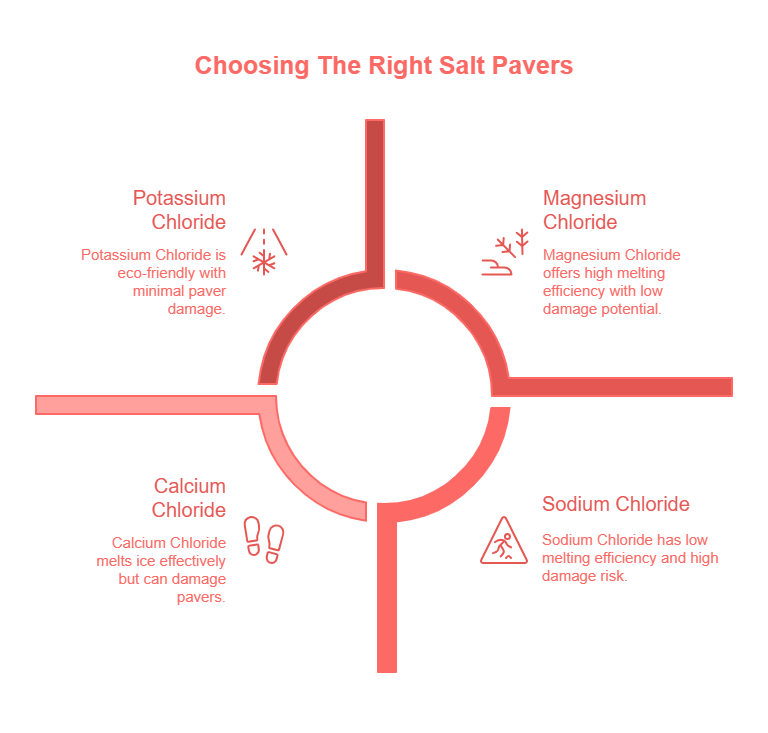Can You Use Salt on Brick Pavers? Everything You Need to Know
- Zayan Rauf

Brick pavers give outdoor spaces a warm, timeless look. Whether they’re used in driveways, walkways, or patios, they add beauty and durability to your home. But when winter comes and icy conditions arrive, many people wonder; can you use salt on brick pavers to melt ice?
The answer isn’t a simple yes or no. While salt can melt ice quickly, it can also cause damage to pavers over time if you use the wrong type or apply it incorrectly. In this guide, we’ll break down everything you need to know, including the best salt for pavers, how to use it safely, and what alternatives might work better.
Table of Contents
Why People Use Salt on Brick Pavers

In winter, icy pavers can be dangerous slippery surfaces increase the risk of falls. Salt is one of the most common ways to melt ice because:
- It works fast, even in low temperatures.
- It’s affordable and easy to find.
- It’s simple to apply.
However, before grabbing any salt bag, you need to understand that not all salts are paver-friendly. Using the wrong salt can cause surface discoloration, cracks, or erosion especially if your pavers are made of more porous materials.
Read About: How Rock Salt Makes Ice Colder
Does Salt Damage Block Paving?
The big question many homeowners ask is: does salt damage block paving?
The short answer: Yes, it can if not used carefully.
Salt can:
- Absorb moisture and create a freeze-thaw cycle, causing cracks.
- Leave white stains (salt residue or efflorescence) that look unattractive.
- Weaken the paver surface over repeated winters.
That’s why experts recommend choosing the best salt for pavers, a type that melts ice without harming the surface.
Check now Ice Melt Salt Manufacturers
Best Salt for Pavers — Choosing the Right Type
When selecting salt for brick pavers, it’s important to know that there are different kinds of salts, and they don’t all work the same way.
Here’s a quick table to help you decide:
Type of Salt | Melting Efficiency | Potential Damage to Pavers | Best Use Case |
Sodium Chloride (Rock Salt) | Works well above -7°C | Can stain and erode brick over time | Short-term, occasional use |
Calcium Chloride | Works in very low temps (-25°C) | Gentler on pavers, but can leave oily residue | Extreme cold conditions |
Magnesium Chloride | Works to -15°C | Safer for pavers and plants | Regular winter use |
Potassium Chloride | Works above -6°C | Minimal paver damage | Eco-friendly choice |
Sand (non-salt option) | No melting, just traction | No damage | Areas where chemical use is risky |
Pro Tip: Sobaan Salts offers high-quality de-icing salts that are less harsh on surfaces, making them a safer choice for protecting your pavers during winter.
Is Salt Bad for Pavers? The Honest Truth
Many homeowners ask, is salt bad for pavers? The truth is: salt itself isn’t evil, it’s the type, amount, and frequency of use that matter.
Think of it like sugar in your diet: a little is fine, too much becomes harmful. If you use salt sparingly and choose the right kind, your pavers will stay beautiful for years. But dumping large amounts of sodium chloride every week in winter will speed up wear and tear.
How to Use Salt for Brick Pavers Safely
If you decide to use salt for pavers, follow these steps to reduce damage:
- Clear snow first – Salt works best on thin ice, not thick snow piles. Shovel before applying.
- Apply evenly – Avoid dumping large heaps in one spot.
- Choose the right salt – Prefer calcium chloride or magnesium chloride over rock salt.
- Rinse after winter – Once temperatures rise, wash your pavers to remove salt residue.
- Seal your pavers – Applying a sealant adds a protective layer against moisture and salt.
Sodium Bricks and Salt — A Risky Combination
Some people refer to pavers as “sodium bricks” because of the way salt interacts with them. If your brick pavers are porous, salt crystals can work their way inside and expand when frozen, causing chipping and cracking. This is why magnesium chloride and potassium chloride are generally recommended; they are less aggressive.
Read More: Himalayan Salt Brick Uses
Alternatives to Salt for Brick Pavers
If you’re still unsure about using salt on brick pavers, here are some alternatives:
- Sand – Great for traction without causing damage.
- Kitty litter – Non-clumping types work well for grip.
- Heated mats – Keep walkways ice-free without chemicals.
- Eco-friendly de-icers – Plant-safe blends available from suppliers like Sobaan Salts.
These options may cost more or require extra effort, but they completely remove the risk of salt damage.
Does Salt Damage All Types of Pavers?
Not all pavers are created equal. Concrete pavers tend to absorb more moisture than clay bricks, making them more vulnerable to salt damage. Natural stone pavers vary depending on the type of stone granite is more resistant, while limestone is more porous.
Before applying any salt for pavers, check the manufacturer’s recommendations or ask an expert.
Maintenance Tips After Using Salt on Pavers
If you’ve used salt for brick pavers this winter, here’s how to keep them in great shape:
- Sweep regularly – Remove leftover salt and debris.
- Rinse thoroughly – Use a garden hose to wash away salt residue.
- Repair small cracks quickly – Prevent water from getting inside.
Re-seal every 2–3 years – Keep the protective barrier strong.
Final Thoughts — Can You Use Salt on Brick Pavers?
That being said, can you salt brick pavers? Yes but only with caution. Salt melts ice & snow easily but if the wrong type is used or not applied correctly this can lead to extended issues of surface erosion, staination and damage jointing. Opt instead for one of the salt pavers, opting from wood chloride and potassium chloride, rather than traditional rock salt, which can cause block paving to deteriorate and damage sodium bricks. As always only sub salt lightly and spread evenly and follow up with a good washing of your pavers after winter ends. Although they are a lifelong investment and proper care can give you decades of beauty in a powerful format. Sobaan Salts Provides the Ultimate De-Icing Solution that are Plant-Safe, Prevents Pavers and Driveways from Damaging with Top-notch Quality and High Performance Down through Cultivated Science!
According to a study by the University of New Hampshire, rock salt (sodium chloride) can reduce the lifespan of concrete pavers by up to 50% due to accelerated freeze-thaw damage. Using magnesium chloride or calcium chloride reduces this risk significantly. (Source: UNH Stormwater Center)
References:
Interlocking Concrete Pavement Institute (ICPI) – https://www.icpi.org/
The Brick Industry Association (BIA) – https://www.gobrick.com/
U.S. Environmental Protection Agency (EPA) – https://www.epa.gov/
Share This Post
Article By

